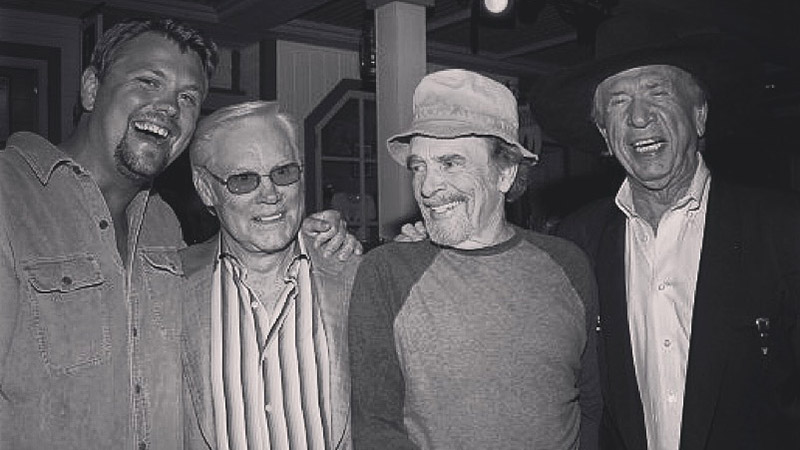Storme Warren recalls time spent with Merle Haggard and the last of his generation of Country artists
“I think if there’s a choice of going on to another life, trying something else, I’d try another one. This has been a great one.” Haunting words echo through my computer speakers as I as revisit my conversations with Merle … Continued

“I think if there’s a choice of going on to another life, trying something else, I’d try another one. This has been a great one.”
Haunting words echo through my computer speakers as I as revisit my conversations with Merle Haggard over the past twenty years. We weren’t friends or even close associates. But I cherish each moment I had with Merle.
Sure, there are the accolades. Forty No. 1 songs, membership in to the Country Music Hall of Fame, multiple ACM and CMA awards including Entertainer of the Year for both. Not to mention the Grammy awards and numerous other honors that marked his amazing career path. But Merle Haggard isn’t defined by pats on the back or industry milestones. Those came anyway.
Merle was a guy. Our guy. Our voice. He spoke the truth. His truth. Our truth. A rebel at heart (his pardoned prison record is just one bit of proof) Hag was a voice for people who didn’t have bandstands on which to stand and speak for themselves. We didn’t need them. We had Merle.
Admittedly, Haggard’s life was filled with numerous peaks and deep valleys. Music saved his life. “I’ve written songs about it, many times,” he told me in a sunny Nashville park sometime in the early 2000s.
“I’d be a fool not to enjoy what’s happened in my life.” Merle once even equated sharing his words and music to a receptive audience to a woman giving birth.
“Artistic success is one of the greatest highs in life. It’s like writing a book and having it accepted around the world. It’s wonderful.”
In my times with him, which grew easier and more comfortable as the years passed, it was hard not to notice his guarded demeanor. He didn’t give you trust. You had to earn it over time. And I was patient. I spent hours on his “Super Chief” tour bus as he tested my opinions on music, government and conspiracy theories.
He didn’t need me to agree with him. He didn’t need anything from me. But if you listened to Merle, with intent and focus, and genuinely engaged with him, he would offer amazing gems…if you listened.
As he once said of his generation, “We are elders in this Country. I am one! We may not have wisdom, but we’re old.” The guard came down. Just for a few seconds. He would smile and even occasionally laugh. Those are my favorite moments I shared with Merle Haggard. Fleeting as they were, those light-hearted moments in our conversations shine like jewels in my memories.
Merle spent his life and career hopping trains — figuratively and literally. He was fan of life’s journey. The railroad was his escape — metaphor and muse all rolled in to one. No doubt inspired by his love of the “Singing Brakeman,” Jimmie Rodgers and the songs and movies that romanticized life on the rails, Merle often, especially in his later years, would express his desire to hop on just one more train — no identification, no baggage, just a guitar and a backpack.
“It would be fun to hop of the circus and let them wonder what happened”.
Merle was a fan of the American spirit. He just wasn’t always a fan of America’s direction. In one of my favorite encounters with him at a Nashville recording studio, the Hag shared memories of his and his peers on tour in a very different America.
“We thought a lot alike and shared areas of American history together. And we shared times that most people can’t conceive of in the area of entertainment. We were part of the beer hall and dance hall community that there’s no longer a hint of. As free-wheeling as the entire U.S. was.”
Each memory he shared with me made me long for a hint of that world.
“How much was it really different?” I asked, not expecting the intense response.
Merle shot darts with his eyes directly in to mine.
“To a degree that’s intolerable for a guy your age, if you actually realized what you lost.”
“Go on!” I pleaded without speaking.
Merle walked through the open door and painted an amazing portrait of a foreign time to me.
“Too much countryside and not enough people. Roads went to the edge of town, and then you got on the railroad track. Each town was characteristically different. Just like the Country artists. You knew you were in Abilene when you pulled in to Abilene. Amarillo when you pulled in to Amarillo.”
He continued on until two gentlemen walked in to the mixing room in the studio, his peers, the late Ray Price and the still very much alive Willie Nelson.
“Hey, Ray,” Merle welcomed. Ray accepted the invitation in to the conversation. “What are you talking about?”
Hag caught his pal up. “I was talking about the community we grew up a part of. The beer joint world of entertainment.”
Ray chimed in, “We were so poor we couldn’t pay attention.”
Willie and Merle smiled.
“I was telling him how mad he’d be if he understood what he missed. Kids of his age.”
Since then, and for forever, Ray Price’s response is etched in to my everyday existence.
“Oh, he missed the best of times.”
Although Merle and his peers often longed for the days gone by, that didn’t stop the last of their breed from continuing to blaze their own trails through music.
“We didn’t change,” Merle asserted. “Country Music went off in a different direction. Several times while I’ve been it. All the directions were good in their own influential ways. But all the years, Ray’s been cutting great albums. Willie does his thing. I do mine. I really don’t care what they’re doing over there.”
Willie finally spoke up: “I don’t think we ever did.”
And once again, I bathed in the sounds of the laughs of three of my elders.
In another interview I asked Merle how he felt about being one of the last of the true rebels in Country music.
“Oh, I think there’s still four of us left carrying our own bands out there on the road,” he told me.
Since that day, three of them are now gone. Merle revealed the pecking order. Willie was number one at the time, followed by Ray Price, himself and then George Jones. “Or maybe George, then me?”
With the passing of Merle Haggard, so ends one of the longest uninterrupted pipelines of traditional Country Music. He felt a responsibility to Country Music and to his mentor, Lefty Frizell. He felt a connection with his fans — so much so, he often battled, even in his failing health, against retirement.
“Gravity is a hell of a thing to beat, and you can only beat it so long”.
Merle said of performing in his later years: “It’s painful, but it’s better than sitting at home and letting people forget about you. It’s the only place I feel safe. I can go on stage with a fever and the flu or whatever and come off the stage and feel healed. It’s a vibration that is kindred to my life, and I’ve got to feel that, I’ve got to have that. If I can’t have that, I’ll die. You know? I’ll dry up and blow away”.
Hopefully, the roots remain.

Music, Sports, News and more
All in one place on the SiriusXM app


